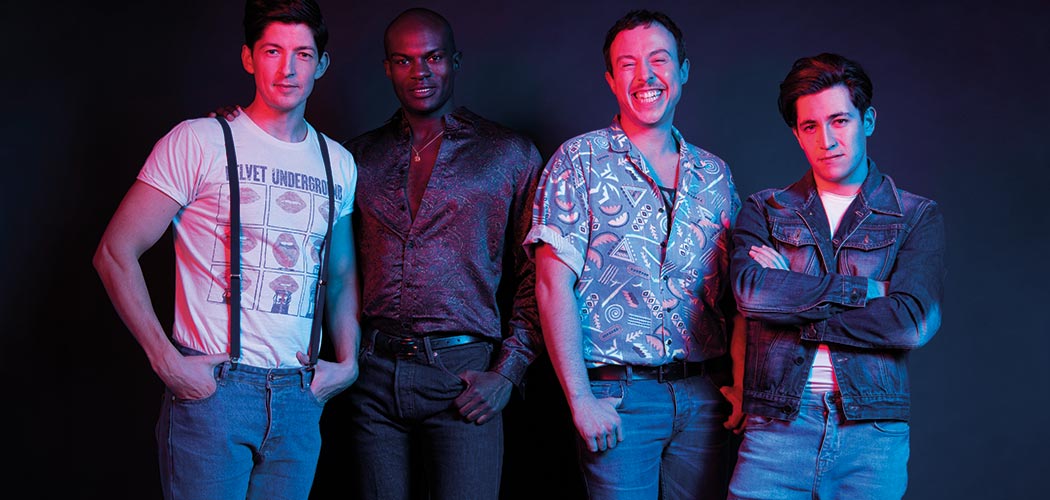Coming Clean by Kevin Elyot premiered at the Bush Theatre in 1982. The play looks at the breakdown of a gay couple’s relationship and examines complex questions of fidelity and love. A new revival of Coming Clean is being performed at the Trafalgar Studios. We spoke to its director Adam Spreadbury-Maher and to new cast member Jonah Rzeskiewicz who plays the cleaner Robert.
Coming Clean director Adam Spreadbury-Maher

It’s 37 years since Kevin Elyot’s play was first performed. What makes Coming Clean still so relevant to gay audiences today?
Coming Clean was the first UK gay play to be staged by all accounts, and by gay play I mean gay characters living relatively normal, everyday lives in a domestic setting which was a huge first for the UK. It encapsulates this beautiful moment after the partial decriminalisation of homosexuality in 1968 but just before the AIDS epidemic: a time where it was legal to be gay without living in fear. In that sense, it is the only play of its time. It is a really important slice of history but it also thoroughly contemporary in that it deals heavily with open relationships. There are also the universal themes of betrayal, jealousy and distrust in a relationship.
The issues of monogamy and openness in gay relationships seem even more complicated today with couples getting wed in a way that Kevin could hardly have believed when he wrote Coming Clean? Does the play have a message for today’s married gay couples?
I think it definitely has a message. It’s an example: if you want to open up your relationship, which many people do and Coming Clean is, in many ways, a celebration of that, then you need to also be aware of everything that comes with it, including the risk that it could damage the relationship. However, I would say that the play holds a lack of strength and honesty in a relationship culpable, rather than open relationships themselves. It shows that betrayal is a wound that is very hard to heal from. This message goes beyond just gay couples which is why Coming Clean has such universality. It’s a strong fable: is this going to help my relationship or am I sabotaging it?
Coming Clean is set in 1982 in Margaret Thatcher’s Britain – is it also a political tale?
It’s certainly political, especially when William is beaten up in a homophobic attack and they contemplate whether they should contact the police but decide not to because they know nothing will be done. It’s very much reflective of the political climate of the time, in particular of Margaret Thatcher’s introduction of Section 28, banning the ‘promotion’ of homosexuality by local authorities and schools.
It came almost before AIDS in the UK, but was the disease referenced at all?
It’s just before the AIDS epidemic in the UK so there is no mention of it – it wasn’t known by this name and no one had heard of it so Kevin didn’t have any idea or perception of it either. However, we do have the character Jurgen who enters towards the end of the play. He is very sex positive – he loves having lots of sex and travelling around the world having sex. He’s in London for the action of the play but he speaks about being in New York. He would’ve been the type of guy who could have potentially been exposed to AIDS. With hindsight, it’s difficult for us to ignore the knowledge that he is at risk – another experience provided by reviving such a play of its time.
Kevin worked as an actor at the King’s Head Theatre before his writing career took off, performing for groups like Gay Sweatshop. Did you know Kevin and can you tell us more about him and the things that mattered to him?
I didn’t personally know Kevin but we can learn about him through reading his work; he put so much of himself into his writing. There is a real sense of autobiography in his work. This is very much the case with Coming Clean. He was interested in chronicling his experiences as a gay man in London and the UK, that is clear.
This new production features three of the cast from last year’s revival but can you tell us about your new cast member and why you chose him?
In true King’s Head style, we are going to be showcasing a new actor in the industry, Jonah, who is making his professional and West End debut. It’s really wonderful and in the spirit of the play, as it was Kevin Elyot’s debut play. It celebrates the values and missions of the King’s Head Theatre – to act as a launchpad for emerging artists which is really in our DNA.
Have you made any changes to the set or styling of the production since last year?
Well, the very nature of Jonah joining the cast gives the production a different feel. He will be bringing a new take on Robert, the catalyst of the play. The arrival of Robert changes the daily rhythms of three characters: Greg, Tony and William. The way that Jonah creates this will be interesting. Tom Lambert did an excellent job before him but they are two very different actors. It’s so special that this is Jonah’s first job and I’m really excited to see what he does.
Coming Clean seems to have special significance for you Adam – having directed the first London revival. Can you tell us about your personal feelings about the play?
It’s very important to me for several reasons. Firstly, when most people think of Kevin Elyot, their minds jump straight to My Night with Reg. Something that I and the King’s Head as a whole are interested in is examining a playwright’s body of work and celebrating the plays that weren’t the huge successes. Coming Clean really was at risk of being lost so I’m incredibly proud that our three productions have been able to exist in a contemporary setting. Personally, I am a gay man and for me, it’s very interesting to learn that the mechanics, challenges and joys of being in a same-sex relationship haven’t really changed at all, other than the introduction of app-based dating. It features experiences that we still go through which we learn through plays like Coming Clean rather than through mentors, many of whom we lost during the AIDS crisis.
Photo of Adam by Simon Webb
Cast photos by Joseph Sinclair
Jonah Rzeskiewicz plays Robert

New Coming Clean cast member Jonah Rzeskiewicz plays Robert, an actor by trade, who cleans and cooks to keep the money coming in. He is employed as a house cleaner by the long term couple of Tony and Greg. Throughout the play we see his career blossom, as well as his relationships with the members of the flat. We chatted to Jonah about his part in the new production of Coming Clean
Had you seen or heard of the play before you were cast?
I hadn’t heard of the play, but I had heard of the playwright Kevin Elyot, having read My Night With Reg while I was training at drama school. I think he’s a gorgeous writer with an honest flair for weaving dialogue.

Have you had to research the time period of 1982 at all? We guess you weren’t even born then?
Absolutely. It is imperative for an actor to try to understand every aspect of the character as possible – including living in the early 80s. Much of the research has meant walking around in Tufnell Park and Kentish Town, and cross referencing locations with pictures in the 80s. I have also looked into the value of money in the 80s, and working out how one could enjoy themselves with the money (or lack thereof) Robert has, of course, adjusted for inflation. I think it is crucial to prepare the dye bath as well as possible, so that through rehearsal the tapestry is dipped and allowed to dry, and then emerges with beautiful colour.
Why do you think the play is still relevant today to gay men’s lives, 37 years after it was first performed?
I think at its core is the question of relationship legalities and infidelity. It is interrogated in a different period, yes, but still demands the same respect and forensic thought that those themes require today. I also recognise that the play centres around very contrasting characters, that all complement each other’s individual plight. Indeed, it is important that people can relate to each character’s journey through the lens of the modern world – and treat them with the same respect that syntax allows for. It truly is a remarkable play, and its bell chimes to the same tune that it did 37 years ago, which I think is really rather triumphant.
The King’s Head Theatre’s revival of Coming Clean is at Trafalgar Studios 2 from 8 January to 1 February at 14 Whitehall, London SW1A 2DY. Tickets from atgtickets.com/shows/coming-clean/trafalgar-studios














